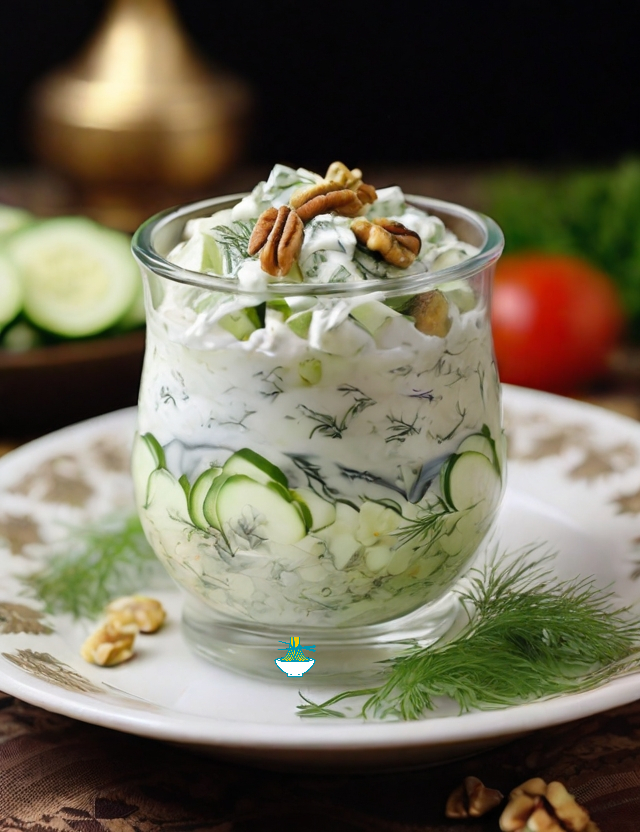Welcome to the world of Bulgarian cuisine, where vibrant flavors and fresh ingredients come together to create delightful dishes. One such culinary gem is the Snejanka Salad, a refreshing and nutritious salad that captures the essence of Bulgaria's rich agricultural bounty. With a medley of crisp vegetables, creamy yogurt, and a hint of garlic, this salad is not only a treat for the taste buds but also a celebration of the country's culinary heritage. Join us on a culinary journey as we explore the recipe for Bulgaria's beloved Snejanka Salad, a dish that brings a burst of freshness to your table.
Ingredients:
- 2 cups Greek yogurt
- 2 medium cucumbers, peeled and diced
- 1 cup walnuts, chopped
- 2 cloves garlic, minced
- 1/4 cup fresh dill, finely chopped
- Salt and pepper to taste
- Extra virgin olive oil for drizzling (optional)

Instructions:
Prepare the Yogurt: In a large mixing bowl, whisk the Greek yogurt until it becomes smooth and creamy. This will serve as the base for your Snejanka Salad.
Dice the Cucumbers: Peel and dice the cucumbers into small, bite-sized pieces. If the cucumbers have large seeds, you can scoop them out to prevent excess moisture in the salad.
Chop the Walnuts: Roughly chop the walnuts to add a crunchy texture to the salad. Be mindful not to make the pieces too small, as you want them to provide a satisfying bite.
Mince the Garlic: Peel and mince the garlic cloves finely. Adjust the amount according to your preference for garlic flavor.
Chop the Fresh Dill: Finely chop the fresh dill, which will contribute a fragrant and herby note to the salad.
Combine Ingredients: Add the diced cucumbers, chopped walnuts, minced garlic, and chopped dill to the bowl with the yogurt. Mix everything together until well combined.
Season to Taste: Season the salad with salt and pepper to taste. Adjust the seasoning according to your preferences.
Chill and Serve: Cover the bowl and refrigerate the Snejanka Salad for at least 1-2 hours before serving. This allows the flavors to meld together and enhances the overall taste.
Optional Drizzle: Before serving, you can drizzle a bit of extra virgin olive oil over the top for added richness and flavor.
Serve and Enjoy: Once chilled, give the salad a final gentle stir and serve it in individual bowls or as a side dish to complement your main course. Enjoy the refreshing and delightful flavors of Bulgaria's Snejanka Salad!
This salad is not only a tasty addition to your table but also a perfect way to embrace the simplicity and goodness of fresh, wholesome ingredients.
Nutritional Values:
Nutritional values can vary based on specific brands and variations of ingredients, but here's a general overview of the nutritional content for the listed ingredients in the Snejanka Salad recipe:
Greek Yogurt (2 cups):
- Calories: Approximately 320 kcal
- Protein: Around 22 grams
- Fat: Approximately 20 grams
- Carbohydrates: Roughly 20 grams
- Calcium: About 450 mg
benefits:
- Protein Source: Greek yogurt is rich in protein, essential for muscle development, repair, and overall body function.
- Probiotics: It contains beneficial probiotics that promote a healthy gut microbiome, supporting digestion and immune health.
- Calcium: A good source of calcium, contributing to strong bones and teeth.
Cucumbers (2 medium-sized, peeled and diced):
- Calories: Approximately 50 kcal
- Protein: Around 2 grams
- Fat: Approximately 0.5 grams
- Carbohydrates: Roughly 12 grams
- Fiber: Approximately 2 grams
- Vitamin C: About 10% of the recommended daily intake
benefits:
- Hydration: Cucumbers are composed mainly of water, aiding in hydration.
- Low-Calorie: Low in calories, making them a nutritious, guilt-free snack.
- Vitamins and Minerals: Provide vitamins and minerals, including vitamin C, K, and potassium.
Walnuts (1 cup, chopped):
- Calories: Approximately 770 kcal
- Protein: Around 18 grams
- Fat: Approximately 75 grams (mainly heart-healthy monounsaturated and polyunsaturated fats)
- Carbohydrates: Roughly 16 grams
- Fiber: Approximately 8 grams
- Omega-3 Fatty Acids: Significant amount
benefits:
- Heart-Healthy Fats: High in omega-3 fatty acids and monounsaturated fats, promoting heart health.
- Antioxidants: Rich in antioxidants, helping to combat oxidative stress and inflammation.
- Protein: Contains plant-based protein, beneficial for vegetarians and vegans.
Garlic (2 cloves, minced):
- Calories: Approximately 10 kcal
- Protein: Around 0.5 grams
- Fat: Almost negligible
- Carbohydrates: Roughly 2 grams
benefits:
- Antibacterial Properties: Garlic has natural antibacterial properties, supporting the immune system.
- Heart Health: It may help lower cholesterol levels and regulate blood pressure.
- Antioxidant: Garlic is a source of antioxidants that protect cells from damage.
Fresh Dill (1/4 cup, finely chopped):
- Calories: Approximately 4 kcal
- Protein: Around 0.5 grams
- Fat: Almost negligible
- Carbohydrates: Roughly 1 gram
benefits:
- Vitamins: Contains vitamins like A and C, contributing to skin health and immunity.
- Anti-Inflammatory: Dill has anti-inflammatory properties that may benefit overall health.
- Digestive Aid: Traditionally used to aid digestion and alleviate digestive issues.
Salt and Pepper:
- These contribute negligible calories, protein, or fat. The nutritional impact is generally minimal.
benefits:
- Flavor Enhancement: Salt and pepper enhance the flavor of the dish without significant nutritional value.
- Sodium Regulation: Salt contributes sodium, important for fluid balance in the body.
Extra Virgin Olive Oil (for drizzling, optional):
- Calories: Approximately 120 kcal (per tablespoon)
- Fat: Approximately 14 grams (mainly monounsaturated fat)
- No protein or carbohydrates
benefits:
- Monounsaturated Fats: Provides heart-healthy monounsaturated fats, which may help reduce the risk of cardiovascular diseases.
- Antioxidants: Contains antioxidants that protect cells from damage.
- Anti-Inflammatory: Olive oil has anti-inflammatory properties, beneficial for overall health.
Remember, these values are approximations and can vary based on specific product brands and measurements. Additionally, the nutritional content of olive oil will depend on the amount used for drizzling. Adjustments may be needed based on individual dietary needs and preferences.


Comments